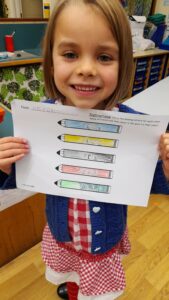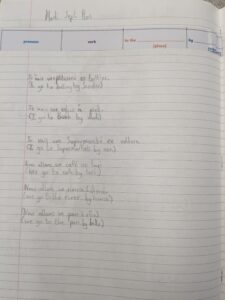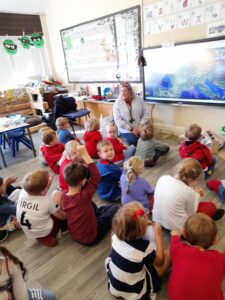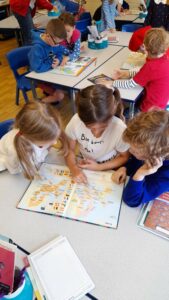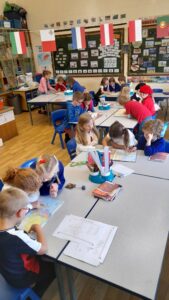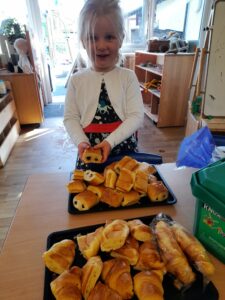At St Mary’s, we offer a relevant, broad, creative and ambitious foreign languages curriculum that will inspire and excite our pupils’ curiosity using a wide variety of topics and themes. Our ultimate vision is that pupils will feel willing, able and confident to continue studying languages beyond key stage 2. We want all pupils to develop a genuine interest and positive curiosity about foreign languages, finding them enjoyable and stimulating. Learning a second language will also offer pupils the opportunity to explore relationships between language and identity, develop a deeper understanding of other cultures and the world around them, and develop emotional intelligence within their language learning. Our vision is that they will be working towards becoming life-long resilient language learners, contributing to a multi-cultural and language diverse global world.
Our Curriculum
Aims – In French, pupils will learn to:
- read fluently
- write imaginatively
- speak confidently
- understand the culture of the countries in which the language is spoken
We aim to ensure that pupils:
- understand and respond to spoken and written language from a variety of authentic sources.
- speak with increasing confidence, fluency and spontaneity, finding ways of communicating what they want to say, including through discussion and asking questions, and continually improving the accuracy of their pronunciation and intonation.
- can write at varying length, for different purposes and audiences, using the variety of grammatical structures that they have learnt.
- discover and develop an appreciation of a range of writing in the language studied.
European Languages Day
We celebrate European Languages Day each year. This provides us with an opportunity to explore different cultures as well as exploring the varying languages around the world. The day was first established by the European Council in 2001 to promote linguistic awareness and encourage language acquisition across Europe, and celebrates language learning and cultural diversity.
Exposing pupils to a wide range of cultures provides an excellent platform on which to embrace diversity, both within school and in the wider community. Activities that explore and celebrate cultural differences provide crucial opportunities to promote respect, empathy and inclusivity from a young age. Exposing children to other cultures and ways of life that are different from their own increases their breadth of life, experience of and understanding of the world.
In addition, the European Day of Languages can also be used to enrich the wider curriculum and provide cultural capital, giving children opportunities to make connections within their learning. Activities are designed to link language learning to other subjects, such as geography, history, art and P.E, providing vital cross-curricular experiences for pupils.
Finally, taking part in this celebration can enthuse and empower even the most reluctant of language learners! Within Modern Foreign Language learning, confidence and a ‘have a go’ attitude are important components of success. With this in mind, encouraging children to have fun with languages can do wonders for boosting enthusiasm and engagement in this curriculum area.
Key Documents
Useful Apps and Websites
Glurbs App – Language Angels a brilliant, fun way for young linguists to learn foreign languages. Children create their own avatar and explore planets by completing fun language exercises (app opens in Google play store)
BBC Bitesize – A selection of resources for KS2 children including games, skills and videos about lots of different topics
TopMarks French – Further resources and games for primary French
French Games – Games based on lots of different French topics, alongside supporting lessons
Duolingo App – The fantastic 5 minute per day app for learning a new language (app opens in Google play store)

 015242 71334
015242 71334 admin@stmarys-kl.cumbria.sch.uk
admin@stmarys-kl.cumbria.sch.uk

